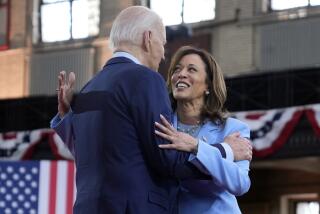Tell Us Who You’ll Pick to Run the Government
- Share via
To Vice President George Bush and Gov. Michael Dukakis :
You ask us to vote for you. In considering our choice, we would like to know as clearly as possible what kind of Administration you will lead if you are elected. Of course, we have seen the platforms, which are supposed to give party positions and philosophy. And you have made speeches touching on diverse issues--mostly telling the public just how you differ from your opponent.
But these are all words, and platforms and speeches in the past have been rapidly forgotten once the votes were counted. Whatever is said during the campaign is designed to win votes. Your words are not a contract, and once you are irreversibly chosen, you are free to do as you see fit.
There is a better way for giving the public a good idea of the kind of Administration they can expect under your leadership. Why don’t you let us know who will be the chief officers of your government? You could say that Joe Bloke has agreed to serve as your secretary of state, John Doe as secretary of defense, as well as a few others who would fill crucial positions. This would define the prospective Administration much better than declarations of policy preferences. The most important thing that a President does is choose the people who are to be in charge of departments, who are to make the day-to-day decisions and help him to make the more important ones. Your most important quality is the quality of people you will have serving you.
The character of people makes the character of government. The important question is not so much whether you favor the B-1 bomber or reform of Medicare, but what kind of persons will be in charge of such matters: well-qualified, sensible, judicious? Or superficial, ill-informed and partisan? As your Administration gets into its stride, more and more of the questions that have to be decided will be new, matters not touched on in the campaign.
Voters will have much more confidence in you if you can tell them that you will surround yourself with persons in whom they have confidence. Moreover, you would spare yourself. As a candidate, you are expected to have an informed opinion on all kinds of things--from technicalmilitary matters to sundry foreign-policy issues, economic and social problems--than you can properly master. If you become President, you are not expected to have an instant answer to everything; you quite properly turn to your advisers before coming to a decision. You should be able to do the same as candidate. And why should your chief advisers not be the same persons who will be with you after your inauguration? Why should you have one set of people helping you formulate campaign policy about the Contras or protectionism, and another set when it comes to putting policies into effect?
In reality, your best claim to our vote is that you will choose the best-qualified officers to carry forward the business of government. Don’t you owe it to us to give evidence of your ability to choose and work with the best? If one of you does this, the other will have to do the same, of course. The voters will then have the best possible opportunity to make an informed choice between two prospective administrations.
As President, you would not be bound necessarily to nominate the persons you named while a candidate. But if you want an eminent person to serve as secretary of state and that person agrees and assists you during the campaign, it is a strong commitment. It is much harder to turn one’s back on a person than on spoken words (“Did I really say that?”).
If you follow this suggestion, it would represent a salutary reform in American politics. It would enable the voters to judge both you and your future collaborators much better. It would also make for a more systematic development of ideas and programs, and there would be fewer surprises after Inauguration Day. Not least, it would raise the quality of high appointments. If presidential aspirants are going to be judged by their nominations to leading positions in government, they will try harder to make top-quality selections.
More to Read
Get the L.A. Times Politics newsletter
Deeply reported insights into legislation, politics and policy from Sacramento, Washington and beyond. In your inbox twice per week.
You may occasionally receive promotional content from the Los Angeles Times.










